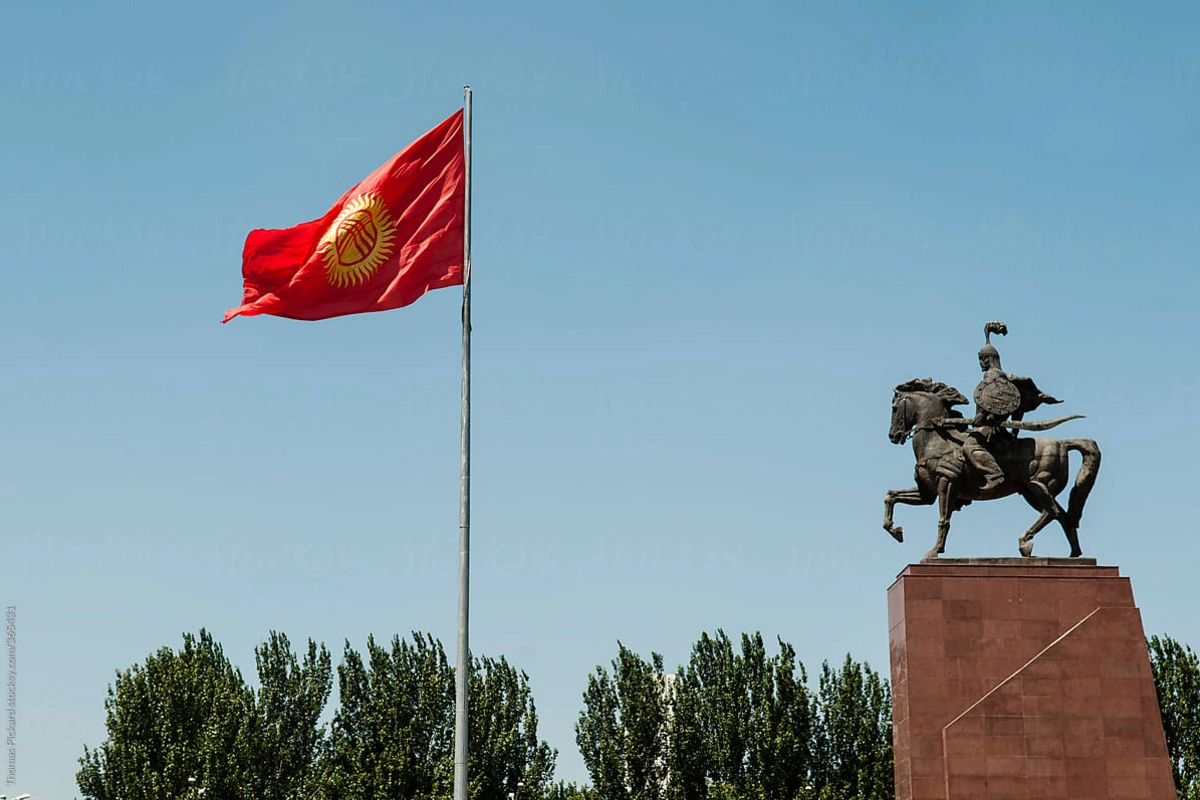
Photo: iStock
In the era of rapid global trade and e-commerce development, creating efficient logistics routes has become the backbone of the international economy. Kyrgyzstan, located at the heart of Central Asia, is taking bold steps to establish itself as a crucial link between Asia and Europe, assuming a strategic role in global logistics.
The launch of the country’s first multifunctional Class A customs and logistics center, Global Hub, marks not only a significant milestone for Kyrgyzstan but also a key component of a new logistics bridge connecting East and West.
As Adylbek Kasymaliev, Chairman of Kyrgyzstan's Cabinet of Ministers, noted: “Global Hub addresses the challenges of the times and opens up vast opportunities. With the development of the China-Kyrgyzstan-Uzbekistan route and the modernization of transport infrastructure, our country has the chance to secure a central place on the global logistics map.”
The New Silk Road: From China to Europe
Developing routes connecting China to Europe through Central Asia has long been a pillar of the global "Belt and Road Initiative." Kyrgyzstan is already actively involved in this program, investing in infrastructure and modernizing customs procedures.
The Global Hub, situated near Bishkek, will become an essential link in this corridor. It offers state-of-the-art warehouse facilities (120,000 m²), zones for cargo processing, sorting, freezing, and multi-temperature eco-fueling stations for electric vehicles.
Stanislav Akhmedzyanov, Managing Partner at IBC Global, emphasized: “The commissioning of Global Hub will strengthen Kyrgyzstan’s position as a Central Asian transport hub. This project will open new avenues for international companies, stimulate regional economic growth, and integrate it into global supply chains.”
The Role of the China-Kyrgyzstan-Uzbekistan Railway
A key element in creating this logistics corridor is the construction of the China-Kyrgyzstan-Uzbekistan railway, set to be completed by 2030.
This route will significantly reduce cargo delivery times from China to Europe, bypassing congested ports. The railway will traverse southern Kyrgyzstan, with long-term plans to connect these tracks to the northern regions, where the Global Hub will be based.
Chyngyz Alkanov, the project’s creator, expressed optimism: “We see Kyrgyzstan’s immense potential as a bridge between Asia and Europe. Global Hub will drive both e-commerce and traditional trade, attract international financial flows, and strengthen the country’s economy.”
Kyrgyzstan as Part of the Global Logistics System
Modern challenges, such as the growing volume of freight transportation and the rise of e-commerce, demand infrastructure capable of handling significant loads. In this context, Global Hub aims to serve as both a local and regional logistics center.
Baiyel Bakirov, a logistics expert, added: “Projects like Global Hub enable Kyrgyzstan not only to secure a spot in Central Asia’s logistics network but also to integrate into global supply chains that are shaping the future economic landscape.”
Global Prospects for the Region
The launch of Global Hub is expected to expand Kyrgyzstan’s warehouse real estate market twentyfold, providing businesses with over 250,000 m² of premium facilities. This development will create competitive conditions for entrepreneurs and attract major international companies.
E-commerce analyst Olga Panina remarked: “Kyrgyzstan’s emergence as a transport hub between East and West presents unique opportunities for e-commerce development. Such projects help the country overcome logistical barriers and accelerate digital transformation.”
However, some experts remain skeptical of the ambitious claims made by Kyrgyz officials, though they commend the efforts of local entrepreneurs and investors to create new jobs.
Kyrgyzstan: A Global Hub or a Grand Illusion?
Recently, a groundbreaking ceremony for the construction of Global Hub was hailed as a breakthrough in Kyrgyzstan’s e-commerce and logistics sectors. However, as Valdai Club expert and economist Kubat Rakhimov pointed out in an interview with The Caspian Post, such bold statements often mask contradictions that demand thorough analysis.

According to Rakhimov, while Chairman Kasymaliev confidently declared the project a key link between Asia and Europe, his deputy Bakyt Torobaev, responsible for investments, described the center as yet another base for exporting agricultural products. Such discrepancies highlight a systemic issue-the lack of a unified strategy for developing the logistics sector.
Kyrgyzstan’s concept of a logistics center is still in its infancy. Instead of a coherent strategy, we face fragmented projects with unclear objectives, Rakhimov noted.
He emphasized that the region around Bishkek is already saturated with logistics projects, many of which remain unrealized. From the "Manas City" project to frozen warehouse complexes, these initiatives often fail due to a lack of coordination and state support.
Kyrgyz businesses suffer from imitation, leading to market cannibalization. Instead of driving economic growth, we risk a series of failed projects where investors and entrepreneurs lose profitability, Rakhimov warned.
The Shadow of the Informal Market
Another factor undermining the effectiveness of such initiatives, according to Rakhimov, is the shadow economy. Kyrgyzstan, as a major hub for informal cargo flows, loses out on taxes and transparent trade operations.
“Without digitalizing bazaars and regulating the shadow economy, logistics projects risk becoming mere facades,” Rakhimov argued.
Nevertheless, the Global Hub project also has positive aspects. Rakhimov noted that it was initiated thanks to the efforts of private investors, demonstrating a willingness among businesses to develop new infrastructure despite the lack of a clear state program.
“If the project focuses on digitalization and controlling cargo flows, it could help combat the shadow economy and increase tax revenues. Implementing fulfillment procedures for marketplace goods could also be a significant step toward modernization.”
Rakhimov concluded: “This project opens new opportunities for collaboration between private businesses and the state, which is crucial for improving the country’s logistics policies.”
Creating multifunctional logistics centers like Global Hub is a strategic initiative with the potential to transform Kyrgyzstan’s economic and geopolitical status, as well as that of Central Asia.
In an era of globalization and booming e-commerce, such projects are vital links connecting major markets in Asia and Europe. Global Hub has all the prerequisites to become a catalyst for Kyrgyzstan’s economic development, attracting significant investments, boosting trade turnover, advancing e-commerce, and creating thousands of jobs.
Thanks to its strategic location and advanced technologies, the center could serve as both a local growth tool and a key element of global trade infrastructure.
For Central Asian countries, these initiatives offer opportunities to strengthen regional cooperation. Developing effective transport routes, launching joint logistics projects, and unifying customs procedures can solidify economic ties within the region. This is especially important given the region's strategic location at the crossroads of major global trade routes.
However, these projects also carry risks. For Kyrgyzstan, financial sustainability is paramount. The success of Global Hub depends on attracting investments and maintaining consistent demand. A lack of funding or low profitability could turn this ambitious idea into an economic burden. Furthermore, competition with neighboring countries like Kazakhstan and Uzbekistan, which are already developing their logistics centers, adds challenges.
Central Asia as a whole faces risks related to environmental issues arising from increased transportation flows. Without adopting green technologies, the region could face serious ecological challenges. Additionally, the high geopolitical activity of major global players like China, Russia, and the US makes the region vulnerable to external influence, complicating the implementation of large infrastructure projects.
Nevertheless, the advantages of such centers far outweigh the risks. For Kyrgyzstan, it’s an opportunity to strengthen its economy and elevate its geopolitical status as a bridge between Asia and Europe. For Central Asia, it’s a chance to integrate into the global economy, enhance mutual cooperation, and attract new investments.
Global Hub is not just a logistics center-it’s a symbol of Kyrgyzstan’s ambitious aspirations for regional leadership. Success will require clear planning, regional cooperation, and the ability to overcome challenges. If implemented effectively, Kyrgyzstan could not only elevate its economy but also become an example for other developing countries striving to find their place in the global economic system.
Share on social media
